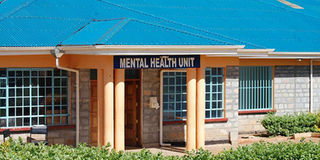KMPDU calls for hiring of more mental health specialists

The mental health unit at the Moi Teaching and Referral Hospital. PHOTO | FILE | NATION MEDIA GROUP
What you need to know:
- Dr Oroko urged county governments and the Ministry of Health to recruit more psychiatrists and other personnel.
- The call comes in the wake of increased suicides and exponential rise of mental disorders in Kenya.
- Kenya has about 19 mental health facilities including the popular Mathari National Teaching and Referral Hospital.
The Kenya Medical Practitioners, Pharmacists and Dentists' Union (KMPDU) wants the government to employ more psychiatrists and other mental health specialists.
The call comes amid a shortage of qualified personnel to handle mental health patients.
KMPDU Chairman Samuel Oroko has urged county governments and the Ministry of Health to recruit more psychiatrists and other personnel in order to improve the sorry state of Kenya’s mental health system.
AFFIRMATIVE ACTION
“The Ministry of Health and county governments should have affirmative action on training and recruitment of more psychiatrists to fill the gaps. For example, while it’s expected that a psychiatrist should serve 30,000 citizens, currently a psychiatrist is serving about half a million citizens.
“The government has not taken sufficient steps to make provision of mental healthcare services available at most health facilities despite the increasing number of mental health patients,” said Dr Oroko in an interview with the Nation.
SUICIDES
The call comes in the wake of increased suicides and exponential rise of mental disorders in Kenya.
According to Dr Oroko, the government should prioritise on hiring more psychiatrists and other mental health practitioners to deal with the shortage and improve treatment and care for mental health patients in the country.
“The Ministry of Health must seek to improve the care for mental patients. We have about 100 psychiatrists and most have been absorbed in the private sector. The ministry, together with the county governments, should endeavour to integrate mental healthcare services at all levels so that all citizens can easily access these services. The Ministry should strengthen mental healthcare linkages to ensure that only referred patients are admitted to Mathari Hospital,” added Dr Oroko.
HOSPITALS
The country has about 19 mental health facilities including the popular Mathari National Teaching and Referral Hospital and the Moi Teaching and Referral Hospital. There are also mental health units in Gigil, Kerugoya, Port Reitz and Kisii.
Nairobi’s Mathari Hospital has a bed capacity of about 700, whereas Moi Teaching and Referral Hospital offers in-patient services and can accommodate up to 70 patients.
The KMPDU official also urged government, through the Ministry of Health, to sensitise the public to demystify mental illness and avoid stigma on people with it.
“Those suffering from any type of mental illness should be encouraged to come out and seek help without feeling ashamed about their condition,” said Dr Oroko.
COMMON PROBLEMS
Besides depression, some of the more common mental health problems are bipolar disorder, dementia and schizophrenia, which globally affect about 60 million, 48 million and 21 million people respectively according to data from the World Health Organisation.
Mental disorders include those affecting mood, thinking and behaviour.
An audit conducted by the Auditor-General’s office between 2011 and 2016 which sought to examine whether the Ministry of Health and county governments have put in place measures that are effective for provision of mental healthcare services, revealed that the numbers of all the different professionals required in provision of mental healthcare services were way below the required numbers.
PSYCHIATRISTS
For example, there were only 92 psychiatrists instead of the 1,533 and 327 psychiatrist nurses instead of 7,666 required in the country.
According to the report, the country has 50 medical social workers instead of the required 920.
Patients in the 22 counties that do not have mental health care facilities have to bear the cost of seeking services in the county nearest to them that has a psychiatric unit.
It also emerged that mental healthcare services in counties that have psychiatric units have also not been adequately managed, with 15 out of 19 psychiatric units visited lacking all the basic equipment while four units had at least one machine with only two units having functional electroconvulsive therapy (ECT) machines.
Globally, an estimated 450 million people have some form of mental disorder, with almost three quarters living in middle and low income countries.





